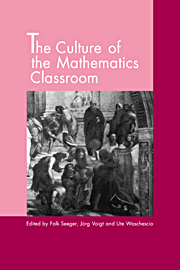Book contents
- Frontmatter
- Contents
- List of contributors
- Acknowledgments
- Introduction
- Part I Changing classroom culture
- Part II Classroom processes
- 5 Reasoning processes and the quality of reasoning
- 6 A constructivist perspective on the culture of the mathematics classroom
- 7 The culture of the mathematics classroom: Negotiating the mathematical meaning of empirical phenomena
- 8 The missing link: Social and cultural aspects in social constructivist theories
- Part III Epistemology and classroom culture
- Part IV Outlook
- Author index
- Subject index
7 - The culture of the mathematics classroom: Negotiating the mathematical meaning of empirical phenomena
Published online by Cambridge University Press: 03 May 2010
- Frontmatter
- Contents
- List of contributors
- Acknowledgments
- Introduction
- Part I Changing classroom culture
- Part II Classroom processes
- 5 Reasoning processes and the quality of reasoning
- 6 A constructivist perspective on the culture of the mathematics classroom
- 7 The culture of the mathematics classroom: Negotiating the mathematical meaning of empirical phenomena
- 8 The missing link: Social and cultural aspects in social constructivist theories
- Part III Epistemology and classroom culture
- Part IV Outlook
- Author index
- Subject index
Summary
One of the reasons why we study the culture of the mathematics classroom is that the classroom appears to live a life of its own. Although mathematics educators and other agents try to improve it and provide for well-substantiated orientations, proposals, and conditions, changing everyday classroom practice appears to be toilsome and accompanied by unintended side effects. Everyday the participants in the classroom develop unreflected customs and stable habits that enable them to cope with the complexity of classroom life while functioning as a resistance to educational reform.
If mathematics educators and teachers collaborate in changing the culture of experimental classes, the change is time-consuming, and the hope of a swift transfer to other classrooms keeps us in suspense. We know from the history of classroom teaching that the fundamental change of teaching styles in regular classrooms has occurred over a period of several generations of teachers (Maier and Voigt 1989).
One could be tempted to blame the resistance on teachers' reluctance. However, school and university teachers often do not notice their habits. If they are given the opportunity to examine videotapes of their own classrooms “under the microscope,” they generally express their surprise about what happens in the classroom microculture. The tradition of “Socratic catechism” still seems to be alive in their classrooms (Maier and Voigt 1992). This involves the teacher's setting a sequence of brief questions that elicit bits of knowledge. Presumably, when acting in this way, teachers reproduce routines that have been developed unintentionally during their schooldays.
- Type
- Chapter
- Information
- The Culture of the Mathematics Classroom , pp. 191 - 220Publisher: Cambridge University PressPrint publication year: 1998
- 21
- Cited by



